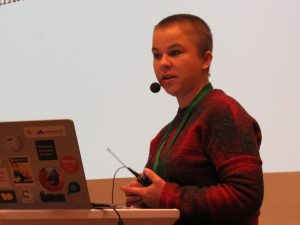Lightning talk at Wikimedia Diversity Conference

By Afifa Afrin (Own work) [CC BY-SA 4.0 (https://creativecommons.org/licenses/by-sa/4.0)], via Wikimedia Commons
This summer I was lucky enough to land a summer job at Wikimedia Norway. And over the course of two months I interviewed six female contributors from both Norway and Sweden, to get their perspective on the gender gap on Wikipedia. We talked about the gender gap among the contributors, but also the gap in terms of the content on Wikipedia. Like the gender imbalance in biographies, and the lack of articles on topics related to women.
They had many compelling observations and opinions on both why there is a gender gap and the consequences of it. One of the concerns they brought up, that I found very intriguing, and the one that I would like to address today, is the growing fear many have, that in the attempt at being as “encyclopedic” as possible, Wikipedia is cementing in place some unfortunate practices.
An example of one of these practises is too strict demands on notability. And I want to point out that the evidences I have are purely anecdotal. It’s based on the experiences of those I interviewed, people who work with the gender gap issue and my own. Nevertheless, the general experience is that the criterias are much stricter and more often applied on biographies about women. And in the extension of this, a woman has to have done a lot more than her male equivalent to be considered notable enough.
Another example is articles or whole topics being deemed “not important enough” or not “worthy of a lexicon”. Sadly, a tendency is that subjects where women traditionally have more knowledge are being particularly scrutinized under these demands.
I’m aware there is an ongoing debate trying to define what Wikipedia is and what Wikipedia is not. My objective, is that when we discuss this, we take into account that throughout history, women, their endeavours and fields of interest has been overlooked, underestimated and at times, ridiculed. The same can be said for a lot of underrepresented populations and people who differentiate from the social majority in any way. A recurring argument is that Wikipedia is not the place to convey progressive ideas. But I object to that. I think that in order to be relevant, Wikipedia has to reflect the diversity that actually exist , and include new ideas and school of thoughts.
So my question to you is: How can we prevent Wikipedia from falling victim to the same conservatism and exclusive thinking that historically has characterized traditional encyclopedias?
And how do you go about discussing this subject with people who disagree with you?
Kategori: Blogg, Hurra for praksisstudenter!, Innlegg forside, Internasjonalt, Mangfold på Wikipedia, Nyheter